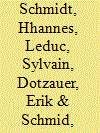|
|
|
Sort Order |
|
|
|
Items / Page
|
|
|
|
|
|
|
| Srl | Item |
| 1 |
ID:
105746


|
|
|
|
|
| Publication |
2011.
|
| Summary/Abstract |
Climate change mitigation and security of energy supply are important targets of Austrian energy policy. Bioenergy production based on resources from agriculture and forestry is an important option for attaining these targets. To increase the share of bioenergy in the energy supply, supporting policy instruments are necessary. The cost-effectiveness of these instruments in attaining policy targets depends on the availability of bioenergy technologies. Advanced technologies such as second-generation biofuels, biomass gasification for power production, and bioenergy with carbon capture and storage (BECCS) will likely change the performance of policy instruments. This article assesses the cost-effectiveness of energy policy instruments, considering new bioenergy technologies for the year 2030, with respect to greenhouse gas emission (GHG) reduction and fossil fuel substitution. Instruments that directly subsidize bioenergy are compared with instruments that aim at reducing GHG emissions. A spatially explicit modeling approach is used to account for biomass supply and energy distribution costs in Austria. Results indicate that a carbon tax performs cost-effectively with respect to both policy targets if BECCS is not available. However, the availability of BECCS creates a trade-off between GHG emission reduction and fossil fuel substitution. Biofuel blending obligations are costly in terms of attaining the policy targets.
|
|
|
|
|
|
|
|
|
|
|
|
|
|
|
|
| 2 |
ID:
094207


|
|
|
|
|
| Publication |
2010.
|
| Summary/Abstract |
During the last decade, there has been an intensive debate on-going in Sweden about how power generation and use affect global warming. More precisely, the discussion has considered how electricity shall be assessed from an environmental and climate perspective in different situations. This article gives a critical analysis on the main viewpoints. A number of environmental-impact assessment principles are outlined and critically examined. Concepts like average electricity and marginal electricity are discussed, and Electricity Disclosure as a basis for evaluation is addressed. The impact from Emission Trading and Tradable Green Certificates is also considered. Recommendations to concerned stakeholders are given. The clash points in the Swedish debate are highlighted and thus made available to a broader audience outside Scandinavia.
|
|
|
|
|
|
|
|
|
|
|
|
|
|
|
|
| 3 |
ID:
111434


|
|
|
|
|
| Publication |
2012.
|
| Summary/Abstract |
Guarantees of Origin (GO) and Electricity Disclosure, as defined in the EU's Renewable Energy and Electricity Market Directives, require that European consumers should be provided with reliable information about the origin of their electricity supply. At the same time, the Renewable Energy Directive requires that support mechanisms be implemented with the aim of increasing the proportion of energy from renewable sources. The Quota System with Tradable Green Certificates (TGC) was established in Sweden as a support mechanism in 2003 and is, from 2012, planned to be extended to become a Swedish-Norwegian system. This article discusses the effects of Electricity Disclosure and the TGC system when working as two separate entities, and the potential interaction between the systems when working in tandem. It appears that Electricity Disclosure may create a customer-driven demand for renewable electricity, which can supplement the TGC system. In the long-term, GOs may thus influence the decisions made by investors in renewable energy. However, currently Electricity Disclosure has very low, or no, impact on the total production of electricity from renewable sources when compared with a stand-alone TGC system.
|
|
|
|
|
|
|
|
|
|
|
|
|
|
|
|
|
|
|
|
|